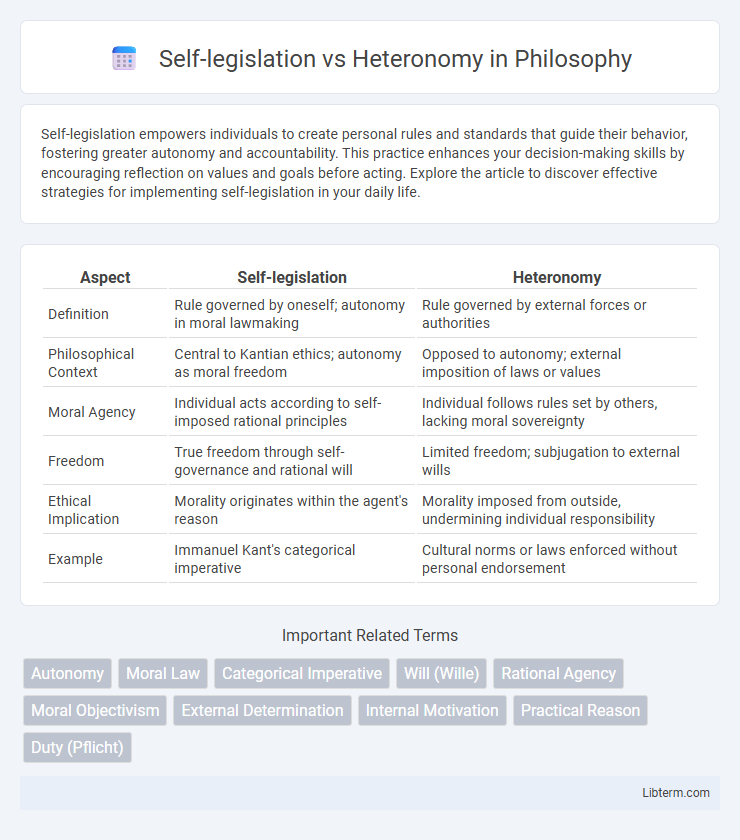Self-legislation empowers individuals to create personal rules and standards that guide their behavior, fostering greater autonomy and accountability. This practice enhances your decision-making skills by encouraging reflection on values and goals before acting. Explore the article to discover effective strategies for implementing self-legislation in your daily life.
Table of Comparison
| Aspect | Self-legislation | Heteronomy |
|---|---|---|
| Definition | Rule governed by oneself; autonomy in moral lawmaking | Rule governed by external forces or authorities |
| Philosophical Context | Central to Kantian ethics; autonomy as moral freedom | Opposed to autonomy; external imposition of laws or values |
| Moral Agency | Individual acts according to self-imposed rational principles | Individual follows rules set by others, lacking moral sovereignty |
| Freedom | True freedom through self-governance and rational will | Limited freedom; subjugation to external wills |
| Ethical Implication | Morality originates within the agent's reason | Morality imposed from outside, undermining individual responsibility |
| Example | Immanuel Kant's categorical imperative | Cultural norms or laws enforced without personal endorsement |
Introduction to Self-Legislation and Heteronomy
Self-legislation refers to the principle where individuals govern themselves through internalized rules and autonomous decision-making, embodying personal freedom and moral responsibility. Heteronomy contrasts this by involving control or influence by external forces or authorities, limiting one's autonomy and imposing external rules. Understanding this distinction is fundamental in ethics and political philosophy, highlighting the tension between personal autonomy and external regulation.
Defining Self-Legislation: Autonomy in Moral Philosophy
Self-legislation in moral philosophy refers to the capacity of an individual to govern their own actions through internal principles and rational deliberation, embodying true autonomy. It contrasts with heteronomy, where moral directives are imposed externally, undermining personal moral responsibility. Kantian ethics particularly emphasizes self-legislation as essential for authentic moral agency and the foundation of ethical law.
Understanding Heteronomy: External Moral Authority
Heteronomy refers to moral decision-making influenced by external authorities or forces, such as laws, social norms, or religious doctrines, rather than one's own rational will. It contrasts with self-legislation, where individuals autonomously govern their actions based on internal principles and reason. Understanding heteronomy highlights the dependency on external moral authority, which can undermine personal autonomy and ethical responsibility.
Historical Evolution of Autonomy and Heteronomy
The historical evolution of autonomy and heteronomy reveals a transition from externally imposed authority to self-governance rooted in Enlightenment philosophy, particularly through Immanuel Kant's assertion that true freedom arises from self-legislation rather than submission to external laws. Ancient legal systems and medieval societies predominantly exemplified heteronomy, where individuals adhered to laws created by monarchs or religious institutions. The rise of modern political theory and democratic movements in the 17th and 18th centuries marked a critical shift towards autonomy, emphasizing individual moral agency and the capacity to legislate one's own actions based on rationality and ethical principles.
Kantian Ethics: Foundation of Self-Legislation
Kantian Ethics emphasizes self-legislation as the foundation of moral autonomy, where individuals act according to laws they give themselves through rational will, rather than external influences or heteronomy. Self-legislation represents the capacity to enact universal moral laws based on reason, forming the basis of the categorical imperative. This autonomy contrasts sharply with heteronomy, where actions are determined by external forces, undermining moral responsibility and freedom.
Psychological Perspectives on Moral Agency
Self-legislation in moral agency reflects the capacity of individuals to autonomously establish ethical principles based on internal values, emphasizing intrinsic motivation and cognitive autonomy. Heteronomy, conversely, involves moral behavior influenced by external authorities or social pressures, often linked to compliance and diminished personal volition. Psychological perspectives highlight how self-legislation fosters deeper moral development through reflective judgment, while heteronomy may correlate with obedience without internalized ethical commitment.
Impacts on Personal Responsibility and Freedom
Self-legislation fosters personal responsibility by empowering individuals to create and follow their own moral rules, enhancing freedom through autonomous decision-making. Heteronomy, where rules are imposed by external authorities, often diminishes personal accountability by shifting the locus of control outside the individual. This dynamic impacts freedom negatively, as individuals may feel constrained and less motivated to act ethically when their actions are dictated by external forces rather than self-imposed principles.
Societal Implications: Law, Culture, and Authority
Self-legislation fosters a society where individuals internalize laws, promoting cultural autonomy and responsible authority rooted in personal moral judgment. Heteronomy, by contrast, imposes external rules that may undermine cultural diversity and legitimize authoritarian control, often leading to social compliance rather than genuine ethical engagement. The balance between these concepts influences legal systems' legitimacy, shaping societal norms and power dynamics in governance.
Contemporary Debates: Relevance in Modern Ethics
Self-legislation emphasizes autonomy where individuals create and follow their own moral laws, while heteronomy involves external authorities imposing rules on them. Contemporary debates in modern ethics question the balance between personal freedom and social obligations, often highlighting how self-legislation supports moral responsibility and authenticity. These discussions are crucial in fields like bioethics, digital privacy, and political philosophy, where the dynamics of individual consent and external control remain central.
Conclusion: Navigating Autonomy and Heteronomy
Self-legislation empowers individuals to govern their actions through internal principles and rational will, fostering autonomy and personal accountability. Heteronomy, driven by external forces or influences, limits freedom by imposing laws or rules without internal agreement. Navigating the tension between autonomy and heteronomy requires balancing self-determined ethics with societal regulations to achieve a coherent and functional moral framework.
Self-legislation Infographic

 libterm.com
libterm.com